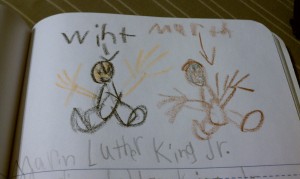Yesterday I came across this article in New York Magazine.
Titled “How Not to Talk to Your Kids: The inverse power of praise,” the article discusses research done by psychologist Carol Dweck at Columbia University, who found that in an effort to not screw up our kids, we are in fact screwing up our kids.
I encourage you to read the article, but the one-sentence version of the story is that we’ve become so focused on building up our kids’ self-esteem and making sure every kid gets a trophy and no one’s feelings are hurt that we’re setting them up for failure when something difficult eventually comes along.
Which, as we all know, it will.
Something difficult eventually came along for Jenny – she took failing her driver’s test hard (much harder than was called for), simply because she had never failed anything before and thought it was the end of the world.
Something difficult eventually came along for me – after graduating from college in three years, I couldn’t find a job. I was unprepared for how difficult the job search would be (and how much effort I would have to put into it) and fell into a deep depression.
In other words, I think Dr. Dweck is onto something.
“Dweck discovered that those who think that innate intelligence is the key to success begin to discount the importance of effort. I am smart, the kids’ reasoning goes; I don’t need to put out effort.”
Makes perfect sense, doesn’t it?
So… what do we do? Obviously completely withholding praise isn’t recommended (or very nice), but the article asserts that the way in which we offer praise can alter the impact it has on our kids.
“By and large, the literature on praise shows that it can be effective—a positive, motivating force. In one study, University of Notre Dame researchers tested praise’s efficacy on a losing college hockey team. The experiment worked: The team got into the playoffs. But all praise is not equal—and, as Dweck demonstrated, the effects of praise can vary significantly depending on the praise given. To be effective, researchers have found, praise needs to be specific. (The hockey players were specifically complimented on the number of times they checked an opponent.)
Sincerity of praise is also crucial. Just as we can sniff out the true meaning of a backhanded compliment or a disingenuous apology, children, too, scrutinize praise for hidden agendas. Only young children—under the age of 7—take praise at face value: Older children are just as suspicious of it as adults.”
Again, this makes a lot of sense to me. Hearing specific things they’ve done right or worked hard on not only focuses on their effort, but shows kids we’re paying attention.
Changing the way we praise our kids – just another thing to add that to the to-do list, right?!?
But seriously… what are your thoughts on all this?

